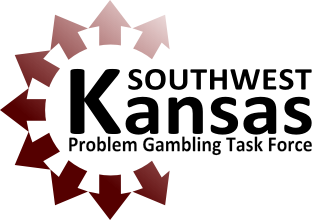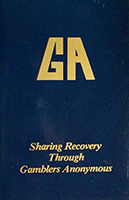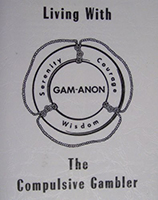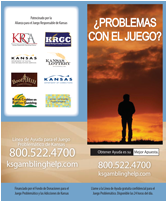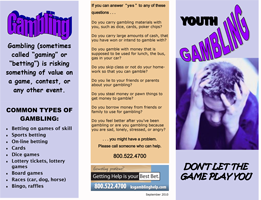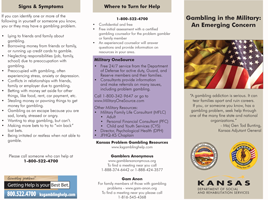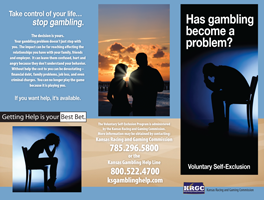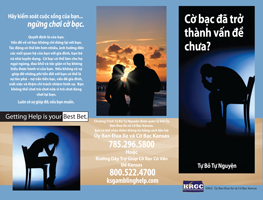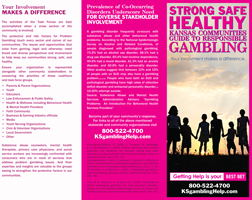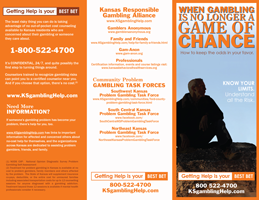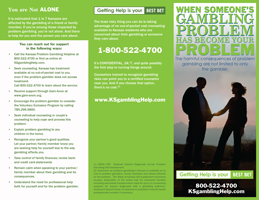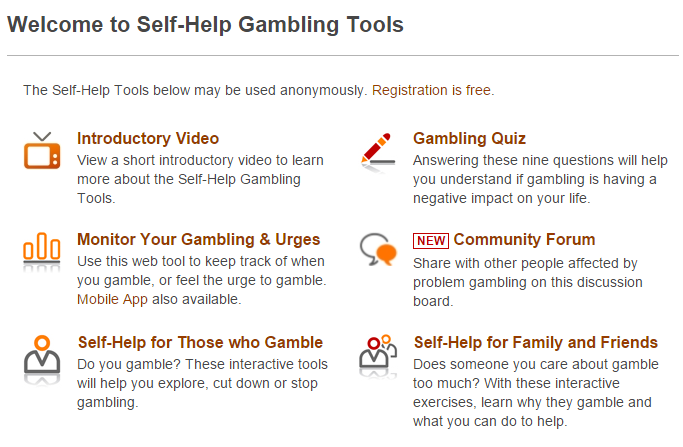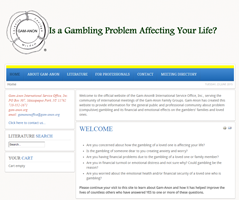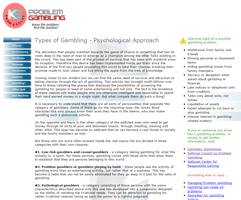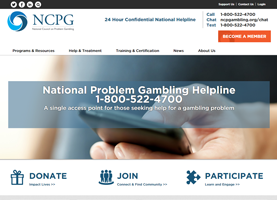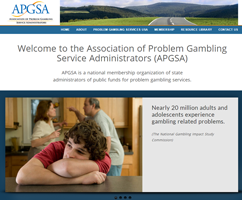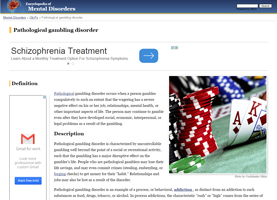Resource Library
Learn more about problem gambling. Browse the books and websites, download flyers and brochures, listen to podcasts and watch the latest videos and documentaries about problem gambling. Find strategies and support that you can use today to help yourself and others.
Books
Flyers and Brochures
Click on any of the flyers and brochures below to read and/or download. You can also order additional copies of Kansas problem gambling printed materials through the Kansas Family Partnerships RADAR Network.
Videos . . .
Know the Warning SignsProblem gambling is one of the most destructive addictions people face, and the consequences can be devastating when it spirals out of control. This 30-second TV PSA created by Whitworth Ballou of Kansas City for the Kansas Alliance for Responsible Gambling builds awareness of how to identify the warning signs of problem gambling, and how to find help in Kansas. The voice-over features well-known TV journalist, narrator and former news anchor, Bill Kurtis.
Judy's Battle with Problem GamblingThe video below tells the story of Judy and her battle with problem gambling. No out-of-pocket cost for treatment to gamblers, their family, and concerned others that reside in Kansas at 1-800-522-4700.
|
Understanding JoyUnderstanding Joy: The Devastation of a Gambling Addiction is a revealing one-hour documentary on the destructive nature of gambling addiction. Enter the mind of a 57 year old woman whose gambling addiction has overcome her sense of morality and driven her to embezzle over $700,000 during a seven year period from two employers. As she awaits sentencing for her crime, she struggles to explain her disease to her children, to the world and to understand herself. National experts on-screen review Joy's symptoms and actions to address: the addictive nature of pathological gambling; the neurobiological evidence showing the brain's addiction; the need for clinical interventions to control addictive behavior; and, the optimal response to gambling addiction from societal and legal perspectives.
In 2013, the American Psychiatric Association reclassified pathological gambling as an addiction, a revision reflecting recent research that revolutionized the understanding of the effects of addictive gambling. Gamblers sometimes say they don't "feel addicted," but their behavior is often similar to that of other addicts as they chase their next high. Problem gambling can lead to other addictions and often spells financial disaster and family devastation as well. This film helps build awareness of the signs of addiction, and underscores the need to train professionals to better serve the gambling-addicted population. |
Websites . . .
Self-Help Gambling ToolsFour free, interactive and anonymous self-help tools are available on another part of the problemgambling.ca website. These tools include:
|
Gamblers Anonymous®GAMBLERS ANONYMOUS is a fellowship of men and women who share their experience, strength and hope with each other that they may solve their common problem and help others to recover from a gambling problem.
The only requirement for membership is a desire to stop gambling. There are no dues or fees for Gamblers Anonymous membership; we are self-supporting through our own contributions. Gamblers Anonymous is not allied with any sect, denomination, politics, organization or institution; does not wish to engage in any controversy; neither endorses nor opposes any cause. Our primary purpose is to stop gambling and to help other compulsive gamblers do the same. |
Gam-Anon®Gam-Anon has created this website to provide information for the general public and professional community about problem ( compulsive ) gambling.
Gam-Anon is a 12 Step self-help fellowship of men and women who have been affected by the gambling problem of a loved one. We understand as perhaps few can. We are familiar with worry and sleepless nights and promises made only to be broken. The message of Gam-Anon is: Come join with us. We too were alone, afraid, and unable to cope with the deterioration in our relationships, the financial problems, and the debt caused by the gambling problem. We know that living with the effects of a loved one's gambling can be too devastating to bear without help. |
Problem Gambling.com™This Web site has been created as a resource for those concerned with problem gambling. The target participants include the gaming industry, government organizations, researchers, counselors, treatment centers, and the public-at-large.
Problemgambling.com™ is concerned with a segment of those who gamble, who become afflicted with problems themselves, or cause social and economic problems for others, due to gambling abuses or addiction. Problemgambling.com provides a central information hub where any person or organization can seek and find information, assistance, training, consulting, products, services, news, and views on problem gambling. It will help raise awareness of the issues associated with problem gambling, which we believe will ultimately lead to better research, prevention and treatment. |
International Centre for Youth Gambling ProblemsSince 1992, Drs. Derevensky and Gupta, along with their colleagues and students, have strived to understand the underlying factors and consequences related to youth gambling problems. Originally established as the McGill Youth Gambling Research and Treatment Clinic, our Centre is, now more than ever, involved in research, prevention, and the training of researchers and professionals concerned with youth gambling and treatment.
|
National Council on Problem GamblingFounded in 1972 by Msgr. Joseph A. Dunne, Dr. Robert Custer, and others, the National Council on Problem Gambling established two principles that remain in effect today: the organization would be the advocate for problem gamblers and their families, and that it would take no position for or against legalized gambling.
Accordingly, the mission of the National Council on Problem Gambling is to lead state and national stakeholders in the development of comprehensive policy and programs for all those affected by problem gambling. The council's purpose is to serve as the national advocate for programs and services to assist problem gamblers and their families. The council's vision is to improve health and wellness by reducing the personal, social and economic costs of problem gambling. NCPG is organized with three classes of members: state affiliate, corporate and individual. The NCPG concentrates efforts on the national level, while the state affiliates work at the state and local level. |
Association of Problem Gambling Service AdministratorsThe Association of Problem Gambling Service Administrators (APGSA) supports the development of services that will reduce the impact of problem gambling. APGSA is an active association that enhances the effectiveness and efficiency of its member organizations through support, information dissemination, and adherence to professional standards.
Our goal is to have our membership include representation from all states providing publicly funded problem gambling services in America. In doing so, we develop, enhance, and support partnerships with stakeholders in the problem gambling field. We address the issues and concerns in this field from a public administration perspective. It is in this area that the APGSA offers its membership an opportunity that cannot be found elsewhere – the collaboration and support of other administrators in this emerging field in the public sector. |
Pathological Gambling DisorderA pathological gambling disorder occurs when a person gambles compulsively to such an extent that the wagering has a severe negative effect on his or her job, relationships, mental health, or other important aspects of life. The person may continue to gamble even after they have developed social economic, interpersonal, or legal problems as a result of the gambling.
This entry from The Encyclopedia of Mental Disorders goes on to detail the definition, purpose, precautions, description, & external resources that can be used to obtain additional information about pathological gambling. |
South Central Kansas Problem Gambling Task ForceThe South Central Kansas Task Force was formed in 2010 and represents the eight counties in South Central Kansas: Sedgwick, Butler, Reno, Harper, Harvey, Cowley, and Sumner counties. Their mission is to coordinate advocacy, education, prevention, hope and treatment options for problem gambling in the community. They maintain a neutral stance about the pros and cons of gambling and instead focus on increasing awareness about helping those impacted by gambling to receive the help they need.
|
